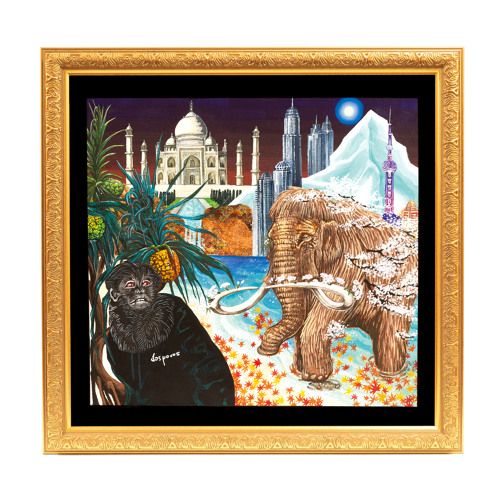
Glow Staff |December 16 2020
The Best Japanese Albums of 2020
Glow Staff
List
December 16 2020
The Best Japanese Albums of 2020
From stadium rock titans to pop crooners, intricate experimentalists to musical and political revolutionaries – we count down the Glow’s best 20 albums to come out of Japan in 2020.
In a strange and tumultuous year, dominated by a once-in-a-lifetime disaster, Japanese musicians continued to release sensational music across a swathe of different genres and styles. The first full year of Japan’s Reiwa era saw the country hit less severely by the pandemic than most (Japan was saved from going into a full national lockdown and saw live shows begin to return in the autumn) but COVID-19 still shook the Japanese music industry, resulting in delays, cancellations and closures – as well as the odd lockdown album and virtual live show.
But 2020 was also the Glow’s first year, and this is our first year-end list. Compiled and written with the help of our new team, our selections range from chart-toppers to experimental visionaries – and, notably, capture the unstoppable rise and rise of J-hip-hop. Here are 20 of the year’s best albums from Japan.
20.
King Gnu: Ceremony

In 2020’s modern Japanese popular musical landscape, King Gnu has been consistently in the spotlight. “Hakujitsu” [White Day], used as the theme song for a TV drama, was a reason for this, one of many melodic tracks from Ceremony that were used in commercial tie-ins.
And each one was a killer tune. King Gnu created a sense of unity with groovy, fast-paced performances, conveying the power of a stadium band yet, at the same time, keeping their finished product rooted in J-pop.
All the while, their lyrics depicted the delicate feelings of flawed human beings, sung by twin vocals that both exuded a sense of presence and felt like a blessing to each of us that are desperately trying to live as ourselves. - Yu Ogihara
Listen: Spotify, Apple Music
19.
kZm: Distortion

kZm belongs to Yentown, a hip hop crew that includes some of Japanese hip hop’s biggest, trendiest names (Awich, Chaki Zulu, MONYPETZJNKMN, among others).
But he is more than just a crew performer. kZm’s a scene lynchpin and, to prove it, Distortion included appearances from up-and-coming rappers like LEX and Tohji, alongside 5lack, a relative veteran – and even one tune with American producer Kenny Beats, who contributes to the languid, violent beat of “Gyakusou” [Reverse Run].
Distortion was also, however, simply full of great tunes, the kind that get you moshing at a live show – in fact, when I saw kZm play “Gyakusou” live earlier this year, I couldn’t help but jump into the mosh. - Minori Yatagai
Listen: Spotify, Apple Music
18.
¥ellowBucks: Jungle

Prior to 2020, Gifu Prefecture’s ¥ellowBucks primarily attracted attention for his solid rap battle skills. Jungle was his first full album; a mixture of subdued, relaxing tunes and tense party bangers – aimed equally at the pop charts as it was at Japan’s on-trend hip hop heads.
Jungle shows an obvious love for G-funk and big hooks – and Bucks is perfect for the job. His low, smooth voice dominates those hooks, and he’s got the attitude to back it. You can feel the lax of Bucks’ shoulders in his music: this is a rapper with the casual, numbing air of a heavy hitter, and Jungle was his opening smash. - Minori
Listen: Spotify, Apple Music
17.
Egoistic 4 Leaves: Debris

An instrumental sextet, Egoistic 4 Leaves consists of a keyboardist, guitarist, bassist, percussionist and two drummers. Each player’s background is extensive, ranging from jazz, Latin and afrobeat music to punk, house and metal. Together, Egoistic 4 Leaves creates genre-transcending tracks with deeply connected rhythmic structures and intricate melodies.
The group’s second record, Debris included nine long and tangled but catchy songs. It felt something like a spacewalk, Egoistic 4 Leaves’ rhythms forming saturnine loops of beautiful, atypical sound – I think they’ll be loved by music nerds around the globe. - Toyokazu Mori
Listen: Spotify, Apple Music
16.
Ichiko Aoba: "Gift" at Sogetsu Hall

“Gift” at Sogetsu Hall was a live recording of a concert by Ichiko Aoba, recorded in January 2020 to celebrate the 10th anniversary of her debut. Summing up her activities in the 2010s, these songs spanned from masterpieces that she has sung throughout her career to “Amuletum” and “Bouquet”, two of her most recent tracks.
Aoba is not only a great songwriter but an overwhelmingly talented musician, who can complete a performance with just a single guitar. As her crystal-clear voice rides on the tone of her guitar, the surroundings are immediately enveloped in a fantastical melody and a soft breeze drifts through the air. "Gift" at Sogetsu Hall was a supreme contemporary folk recording: peaceful and dark – it invited you to the heavens. - Yu
Listen: Spotify, Apple Music
15.
Shunichiro Yokosawa: Zettai Daijoubu

Shunichiro Yokosawa’s debut album Haiji was explained by one publication by way of such broad influences as Scottish alt-rock band Teenage Fanclub and Australian plunderphonic revolutionaries the Avalanches. Zettai Daijoubu [It’s All Right] was the producer and vocalist’s second effort, made in his bedroom with additional help from his band Laser Beams, plus two more guitarists.
Yet Yokosawa’s work was far more than just guitar rock. It included ‘70s funk and soul, as well as nostalgia for ‘90s J-pop. His melodies were positively evergreen; his lyrics pure. On the song “Kimi no Hoppe” [Your Cheek], for example, he sang: “I love your cruelty / Don’t be an adult”. Yokosawa might be singing about his girlfriend; but his soft and tender melody reminds me of holding a young child – great music always has different interpretations for different people. – Toyokazu
Listen: Spotify, Apple Music
14.
Scha Dara Parr: Shin Scha Dara Parr Dai Sakusen

Thirty years since their debut, three-man rap group Scha Dara Parr continue to be at the forefront of Japanese hip hop.
Shin Scha Dara Parr Dai Sakusen [Shin Scha Dara Parr’s Great Strategy] was a commemorative album that captured the quintessence of Scha Dara Parr. Most unmissable was “Shin Scha Dara Parr’s Theme”, as well as “Forever Young”, a long-awaited collaboration with fellow Japanese hip hop oldheads Rhymester.
Dai Sakusen justifies the established appeal of Scha Dara Parr: straightforward and cool but still mind-blowing, they’re a worthy introduction for anyone unaware of the Japanese hip hop scene. - Mutsumi Okazaki
Listen: Spotify
13.
YeYe: 30

Kyoto-based singer-songwriter YeYe can play almost any instrument. On 30, she empowered her brand of eclectic electronic pop and folk music with a vibrant chamber pop orchestra.
30, YeYe’s fifth album, went on to explore several themes about our daily life. On “Shiawase niwa Naranai” [We Could Not be Happy], for instance, she sang: “We are not going to be happy / but keep your spirits up”. YeYe recognises that we’re all different – we don’t have to pretend to be other people in order to be happy. While I am not you, and you are not me, it is most important to keep spirits up for us all. – Toyokazu
Listen: Spotify, Apple Music
12.
Meitei: Kofū

Following the ghost stories of Kwaidan and static winds of Komachi, Kofū completed Meitei’s trilogy of works that plundered the rich depths of traditional Japanese folk music. It was also the best of the series, a winding “satire” of old aesthetics and a sumptuously atmospheric exploration of Japanese musical history.
On Kofū (transliterally old-fashioned), Meitei deconstructed notions of how traditional music should sound and how it should be used. Crucially, however, he dismantled the music itself. Sliced and reassembled into rhythms and soundscapes, Meitei bolstered his tapes with electronic and live instrumentation.
The complete Kofū blurred the lines between traditional and contemporary, an innovative and ingenious work and one of the standout electronic music records of 2020. - Ed Cunningham
Listen: Spotify, Apple Music
11.
Nene: Yumetaro

Nene’s first solo release in two and a half years, Yumetaro expressed her duality by focusing on the theme of Japanese yōkai (a type of folkloric Japanese supernatural monster).
The EP was packed with songs of completely different vibes. The emotional and personal “Jiai” contrasted with the sensual and mysterious likes of “6969” and “Meiki”. On “Inferno”, meanwhile, earbuds could barely contain the elation and excitement of Nene’s emotional verses.
Some of the original sampling material also makes for essential listening, too. Yellow Magic Orchestra’s “Tong Poo” and Nipps and I-DeA’s “Rich Man, Poor Man”, in particular, are both brilliant classics in their own right. - Minori
Listen: Spotify, Apple Music
10.
Daoko: Anima

Daoko typifies a new generation of rapper, having begun her career by sharing music and videos on social networking sites linked to manga and anime. But her fourth album Anima was inspired not only by those subcultures but by Daoko’s wider reading – referring to books on philosophy, psychology, biology and animism.
In an interview for Natalie.mu, Daoko explained that “anima”, at the root of the English word “animal”, means “life” or “soul” in Latin. The title track, she explained, was named after Carl Gustav Jung’s psychological “anima”, referring to the feminine character of men. Throughout Anima’s electronic pop tracks, Daoko rapped about love, sex and life on such a profound level that it could even be some kind of prayer. - Toyokazu
Listen: Spotify, Apple Music
9.
Fujii Kaze: Help Ever Hurt Never

Fujii Kaze received a lot of attention in the Japanese music scene throughout 2020. Recognised on both Spotify’s “Early Noise” playlist and YouTube’s “Artists on the Rise” series, 2020 was expected to be his breakthrough year – and that it certainly was.
On Help Ever Hurt Never, Kaze played the piano freely (as listeners have become accustomed to in his immensely popular YouTube cover series), singing in a tone of voice both sweet and husky. Sung in his hometown Okayama dialect, the breadth of Kaze’s vocal ability was overwhelming.
Help Ever Hurt Never was an awesomely contented album and an invincible debut, with everything you could want to make your ears and heart happy. – Mutsumi
Listen: Spotify, Apple Music
8.
Takuro Okada: Morning Sun

Plush and lively, filled catchy hooks and stylish guitar licks, on first appearances Morning Sun had all the hallmarks of a proficient but standard folk rock release. Without any rush, every phase of Takuro Okada’s music was measured, and every performance carefully kept within certain confines of taste and exertion.
Yet Okada’s blissful folk wasn’t as mellow as it first seemed. Teasing the fringes of art pop, indie and psychedelia, Morning Sun showed a penchant for testing repetition and protracted swathes of sound design. It was abnormally detailed, too – not only was Morning Sun meticulously arranged and performed, but Okada’s own production was remarkably clear.
Morning Sun amounted, therefore, to a series of contradictions. Understated but majestic; simple but severely talented; outwardly conformant but unique in its details. – Ed
Listen: Spotify, Apple Music
7.
5lack: Kono Keshiki mo Kohete

5lack’s smooth, English-styled flow and sarcastic, playful lyricism stand apart from many of the current trends in the Japanese rap scene. Kono Keshiki mo Kohete [Beyond This View] was a sequel to 5lack’s previous album, 2018’s Keshiki, inspired by his recent move to Fukuoka."
Grind the Brain" thoroughly captured 5lack’s well-honed 90s hip hop style, while "Hero ha Nichiyoubi ni Nemeru” [Hero Sleeps on Sunday] saw him employ a soft singing voice and “Toumei Shoujo” [Transparent Girl], on the other hand, was fascinatingly melancholic. Kono Keshiki mo Kohete showed that 5lack continues to be a solid, versatile, skilful hip hop artist. - Minori
Listen: Spotify, Apple Music
6.
Dos Monos: Dos Siki

Experimental hip hop trio Dos Monos unearthed new ways to rebel and beguile on Dos Siki, their follow-up to 2019’s critically-adored Dos City.
Escalating the chaos of each element of their sound, the group still thrived on the anarchic sampling of bits of Zappa, Beefheart and old jazz, but ramped up the pace and intensity. Dos Siki’s instrumentals, hazardously frantic and mesmerizingly convoluted, were stranger and more psychedelic, matched by the trio’s lyrical mayhem.
More topical and more relevant, Botsu, TaiTan Man and Zho Zhit found avenues to weave palpable political and social themes into their lyrics without losing their signature ambiguity and abstraction. Even at just under 16 minutes, Dos Siki piled in more ambition, ingenuity, and food for thought than almost any other release this year. - Ed
Listen: Spotify, Apple Music
5.
Moment Joon: Passport & Garcon

Osaka-based rapper Moment Joon portrayed the duality of a human being in Passport & Garcon. The entire album was composed of a story, with the sounds of life mixed with colourful instrumentals to create a sense of presence and reality. Joon discussed his experiences as an “immigrant rapper” in Japan, cutting into themes of dignity, discrimination, stereotypes and more; his ingenuous nature showing his emotions waver in a delicate way.
All of these themes are an unmistakable reality of modern Japan and, while the album followed Joon’s story of a single man, this work was more than mere fantasy. Passport & Garcon asked necessary questions about today’s Japan, about the attitudes and ways of being of Japanese people – and, crucially, it was ambitious enough to suggest the possibility of change. - Yu
Listen: Spotify, Apple Music
4.
Mei Ehara: Ampersands

Mei Ehara is a remarkably multitalented artist. As well as her own solo musical work and guest appearances on big-name tracks by Yogee New Waves and nakayaan, Ehara presides over literary magazine SONO and is famed for her photography.
Ampersands was her second studio album. Wrapped in a colourful jacket designed by New York-based artist James Ulmer, and released on iconic Japanese indie label Kakubarhythm (also home to the likes of Cero and Skirt), Ampersands revelled in Ehara’s soft, enveloping voice.
Perfect for days off or time after work, Ampersands is slow, comfortable and composed immaculately – a must-listen. - Mutsumi
Listen: Spotify, Apple Music
3.
Mom: 21st Century Cultboi Ride a Sk8board

On his third album, singer-songwriter and beatmaker Mom re-emerged with a distinct, quirky pop music presence – one that set him apart from trap and chilled hip hop. Weaving experimental styles like noise and home folk recordings into high-fidelity sound, Mom’s DIY approach to production created a unique and abstract patchwork sensation.
As Mom rapped and sang, he span striking stories that combined a science fiction worldview with satirical comments on human relationships and society. And, despite that sci-fi outlook, he delved into real-world topics such as news, cynicism, and the subtleties of life and emotion.
Mom’s overarching story sharply pierces his distinctive, bitter instrumentals - 21st Century Cultboi Ride a Sk8board could only have been made by Mom, neither a rapper nor a bandman. - Yu
Listen: Spotify, Apple Music
2.
Gezan: Klue

With Klue, Gezan raised a number of issues for the people of Tokyo and Japan. Beginning with a warning to listeners, the album’s 43 minutes heedlessly ran without halt. One could feel Gezan’s extraordinary conviction and, at the same time, the listener was encouraged to confront the work before their ears.
Produced by engineer Naoyuki Uchida, the sound was in a noisy post-hardcore style, with a touch of dub. The lyrics, shouted by vocalist MahiTo the People, described the violence, insanity and escapist dependencies of modern society – but they were also connected to life, people, and you and me.
It’s precisely because every part of Klue was connected to the earth and everyday life that is resonated as such essential music for 2020. It radiated reality, a warning bell that appealed to the heart. - Yu
Listen: Spotify, Apple Music
1.
chelmico: Maze

Back in January, MCs Rachel and Mamiko blasted out of the blocks with “Easy Breezy”, the opening theme of Keep Your Hands Off Eizouken! and their biggest hit yet. Reaching 8 million views on YouTube, the infectious, high-tempo fun of “Easy Breezy” brought chelmico greater attention both within and beyond Japan.
Maze collected 13 songs just as boundless, pacey and unpredictable as “Easy Breezy”. Each track had starkly different musical characteristics; each moment was packed with rich, colourful expressions of joy, sadness, and carefree energy. Maze’s nature as a collection of standalone cuts made it endlessly replayable – but it was worldbuilding, too. And once you’re subdued into chelmico’s world, you’ll surely be addicted. - Mutsumi
Listen: Spotify, Apple Music



